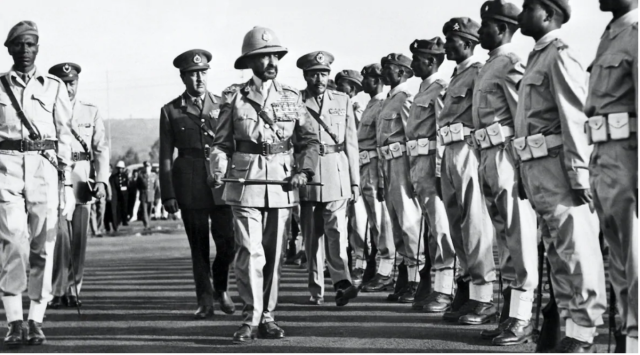 The prize committee announced this week that the New York-based writer is among the six authors shortlisted for the 2020 Booker Prize for her acclaimed new novel 'The Shadow King.' (Courtesy photo)
The prize committee announced this week that the New York-based writer is among the six authors shortlisted for the 2020 Booker Prize for her acclaimed new novel 'The Shadow King.' (Courtesy photo)
Tadias Magazine
By Tadias Staff
Updated: September 18th, 2020
New York (TADIAS) — Ethiopian-American author Maaza Mengiste has been named one of the final candidates for the prestigious Booker Prize.
The prize committee announced this week that the New York-based writer is among the six authors shortlisted for the 2020 Booker Prize for her acclaimed new novel The Shadow King.
The shortlist was chosen out of 162 books by a panel of five judges: Margaret Busby (chair), editor, literary critic and former publisher; Lee Child, author; Sameer Rahim, author and critic; Lemn Sissay, writer and broadcaster; and Emily Wilson, classicist and translator.
“As judges we read 162 books, many of them conveying important, sometimes uncannily similar and prescient messages,” the announcement said. “The best novels often prepare our societies for valuable conversations, and not just about the inequities and dilemmas of the world − whether in connection with climate change, forgotten communities, old age, racism, or revolution when necessary − but also about how magnificent the interior life of the mind, imagination and spirit is, in spite of circumstance.”
The press release notes that “Maaza Mengiste was born in Addis Ababa, Ethiopia. A Fulbright Scholar and professor in the MFA in Creative Writing & Literary Translation programme at Queens College, she is the author of The Shadow King and Beneath the Lion’s Gaze, named one of the Guardian’s Ten Best Contemporary African Books. Her work can be found in the New Yorker, Granta, and the New York Times, among other publications. She lives in New York City.”
This year’s winner will be unveiled on November 17th during a virtual event that will be broadcast live on BBC from London.
–
Related:
Maaza Mengiste on the untold story of Ethiopia’s women warriors during Italian occupation

Ethopian-American writer Maaza Mengiste, author of the novels Beneath the Lion’s Gaze and The Shadow King, spoke with Eleanor Wachtel in 2020. (Nina Subin)
In her new novel, The Shadow King, Maaza Mengiste draws on surprising discoveries about the role of women during Italy’s 1935 invasion of Ethiopia — a conflict that many consider to be the start of the Second World War.
The story revolves around Hirut, a young Ethiopian woman who takes up arms to join the fight against Mussolini’s brutal occupation. In the course of writing the book, Mengiste discovered that her own great-grandmother had been on the front lines. The novel also features a sensitive portrait of Emperor Haile Selassie, who ruled Ethiopia for more than 40 years.
Ambitious and epic in sweep, The Shadow King is an unflinching exploration of history and memory, class and gender, and the perspectives of women and girls during war. Marlon James has described it as “beautiful and devastating,” while Salmon Rushdie proclaimed it “a brilliant novel, lyrically lifting history towards myth.”
Born in Addis Ababa in 1971, Mengiste fled the country with her family during the Ethiopian Revolution, moving to Nigeria and Kenya before being sent alone to the United States at age seven. She now makes her home in New York.
She spoke to Eleanor Wachtel from the CBC’s London studio.
These legends carried me through
“I grew up with the stories of a poorly equipped Ethiopian military confronting one of the most technologically advanced militaries in the world at that time.
“For a child, this was a story that felt epic. It was mythic. We were not supposed to win — and yet we did. I grew up imagining these heroic figures. I carried those figures with me when I moved from Ethiopia eventually to settle in the United States.
“They helped me understand what it meant to be Ethiopian, what it meant to have a history.
“These stories, the myths and the legends: my images of those soldiers, I really think, carried me through some difficult times as an immigrant and as a young girl who was black in a town that didn’t understand her.”
Women and warfare
“I had no idea [about my own great-grandmother's experience in the war]. I wrote this book, did my research and searched for women who were fighting in this war — without any sense of my own great-grandmother’s story. When the book was almost done, I visited Ethiopia on a last-minute research trip while I was in the process of editing the book.
“My mother went with me on this trip, as she has done on several other research excursions I’ve made to Ethiopia. In conversation with her, I told her about a photograph I found of a woman in uniform, and how excited I was about that.
“It confirmed what I had always thought, which was that these women really existed — and she casually said, ‘Well, what about your great-grandmother?’
“It was almost as if she had spoken in a foreign language. My brain couldn’t conceive it. I turned to her and said, ‘What did you say?’
“She told me the story of my great-grandmother, who had enlisted to fight in the war — and who had taken her father before the village elders and demanded the gun that was his and would eventually be passed down to her. But she wanted it right then: she went to war and I had never heard this story before in all the years of working on this book.
“I heard the stories of men in my grandfather’s generation who fought. I heard the stories of the ways that women took care of the wounded, buried the dead and collected water. I heard the stories of people in very traditional roles of warfare. But I had no sense that women did much more in that war.
“I had no sense that those stories also were running in my own family.”

An undated picture of Haile Selassie, the last Emperor of Ethiopia, reviewing troops in Addis Ababa. (AFP via Getty Images)
A point of pride
“The confrontation with Italy — both the first one in the late 1800s and then the one in 1935 — helped establish a narrative of Ethiopian history. It established Ethiopia as a place, a country that other Africans, other African-Americans could look toward with pride. It helped Ethiopians figure out a way to define themselves.
“[These were] people who were supposed to be conquered, and yet were not. It established a way to think about the country and the people. I grew up with some of that rhetoric, that legend, the myths. It’s something that went beyond Ethiopia as well.
“It helped define a way of blackness, a way of being African, which was something that was very different from the stories of colonialism, of being enslaved. These were people who fought against colonizing forces, who fought against Europeans, who fought against the white men and won.
“That was a source of pride for people across the world — from Harlem all the way into Nigeria and Ghana.”
—
Join the conversation on Twitter and Facebook.

























